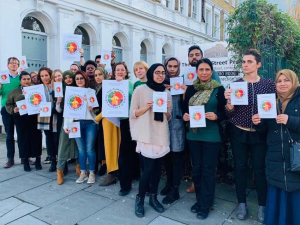 Dr Emma Radcliffe is a member of Tower Hamlets LMC, a GP in the borough and Primary Care Net Zero lead for North East London. Ahead of London Climate Action Week she writes about how practices can be more sustainable.
Dr Emma Radcliffe is a member of Tower Hamlets LMC, a GP in the borough and Primary Care Net Zero lead for North East London. Ahead of London Climate Action Week she writes about how practices can be more sustainable.
It is difficult to think about anything at the moment in general practice other than just getting through the day. I am a GP principal and I am living through these difficulties too. However, there are even bigger problems that we need to face up to. The climate emergency presents a ‘catastrophic’ threat to health. We are part of the problem and we therefore need to be part of the solution. The good news is some of the actions practices can take are easy, most of them improve health of patients and ourselves and do not necessarily cost a lot.
My suggestions would be for low effort and high impact work:
- Energy use: The single biggest and effective change you can make is to switch to a green energy provider. If combined with a ‘switch off’ policy, you are likely to make a cost saving. The Energy Saving Trust have advice on who the greenest suppliers are.
- Asthma: We are already doing asthma reviews as part of QOF and various incentive schemes, so why not ensure they have a green focus? The Investment and Impact Fund respiratory and sustainability indicators incentivise high quality, low carbon asthma care.
- Go paper-light: Save resources by switching to electronic communication as far as possible. Reducing the amount of expensive printer toner used will also lead to cost savings. Use recycled paper if you have to print documents, yes it looks a bit different, but if you explain in a footnote why you are using it most people are happy with the difference. Avoiding plastic-windowed envelopes also ensures they are recyclable.
- Active transport: Encourage your staff (and your patients) to come to the practice via foot, bike or public transport. Consider signing up to a cycle to work scheme.
- Go for gold! Explore the challenges set by the Green Impact Toolkit or look at the Greener Practice website which has a range of resources for you. The SEE Sustainability website can help you to calculate your non-clinical carbon footprint and reduce it!
Other resources:

